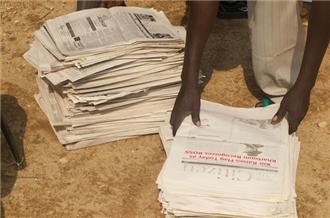S. Sudan security confiscate copies of independent newspaper
December 11, 2013 (JUBA) – Members of the South Sudan security services raided the printing press of the country’s leading independent English newspaper, confiscating all copies of the publications that were due for distribution, The Citizen‘s editor said Wednesday.

Bol attributed the confiscation to The Citizen‘s coverage of Bol’s arrest and detention by South Sudan’s security services on Tuesday. The leading journalist, who has been detained by the authorities on numerous occasions, was released after several hours “behind doors”, following political intervention from higher level authorities.
In recent months critics have accused the government of adopting the same repressive attitudes that led to the South fighting decades of civil war against various Khartoum regimes until a 2005 peace deal allowed for independence in July 2011.
In the two and a half years since independence, human rights organisations, civil society groups, journalists and individuals who hold critical views about the conduct of senior government officials, have complained of sustained harassment, torture, arbitrary actions and arrest and detention.
Government agents are alleged to act on the directives and orders of some senior government officials in order to silence their political critics and to scare the media from reporting on sensitive issues, often leading to self-censorship.
In November, South Sudan’s new minister of information and broadcasting, Michael Makuei Lueth, ordered all journalists to register and acquire new government identification cards.
The move has been rejected as unconstitutional by South Sudan’s independent media outlets and has been criticised by press freedom groups.
Alfred Taban, the Editor in Chief of the Juba Monitor, who led a delegation of South Sudanese journalists to a meeting with the information minister last month, said they not could reach any understanding because the order was illegal and unconstitutional.
Several media practitioners and civil society organisations have expressed dissatisfaction with the new directives and warned the government against tightening freedoms and suppressing individual rights.
The confiscation of newspapers when they covering events critical of senior government officials, specifically the president and security agents, is tactic also practiced by the Sudanese government.
Copies of the independent Al Masir Arabic newspaper were confiscated on 7 December, allegedly for publishing a detailed report of the press conference convened by the senior SPLM leaders to criticise the leadership of president Salva Kiir Mayardit on 6 December.
In 2011, the editor-in-chief of the English version of Al Masir was arrested and the paper was subsequently suspended infinitely on the grounds that it published an opinion article critical of the marriage of president Salva Kiir’s daughter to an Ethiopian.
“The current developing events within the leadership of the SPLM are interesting to say the least, and it requires the government to allow the media to adequately inform the general public without fear of reprisals. Doing the opposite compromises not only the principle cause and objective of the liberation struggle but constitutional commitment of the government itself to promoting and strengthening democratic institutions”, Dominic Aguer Wol, who is from South Sudan’s Northern Bahr el Ghazal state, told Sudan Tribune on Wednesday.
Wol said it would be “backtracking” if the government, which came to exist as result of fighting a repressive system uses the same repressive procedures in order to crackdown on newspapers and media outlets as well as to harm them financially though confiscating their issues; leading to their closure.
“I call on the government in my capacity as a citizen of this country, to stop its anti-media campaign and instead use the rule of law in its engagement with the media and journalists,” said Wol.
Newspaper staff says they are contemplating holding a demonstration in the capital, Juba, to protest over the seizure of their newspapers and have submitted a memorandum to the parliament to present to the government.
No date has so far been agreed as some media practitioners argue that they should first convene a meeting first with officials at the ministry of information, security services, police and military.
(ST)
